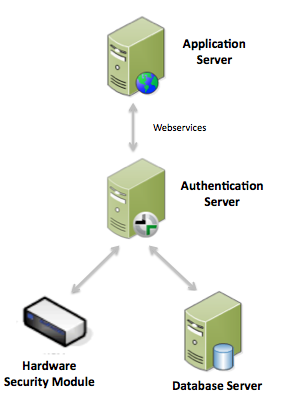Authentication Server
The Emue Authentication Server is deployed on a Microsoft Windows platform within a client’s technology infrastructure behind web and application servers, usually parallel to the user directory or database.
Emue’s solution communicates with relational databases such as MS SQL and/or an LDAP directory such as Microsoft’s Active Directory to exchange and store specific cryptographic information. Load balancing and clustering for high availability configuration are supported. HTML login pages are created by the host within their web tier and all Emue functionality is delivered to the application layer through web services.
The diagram below illustrates a typical configuration of the Emue Authentication Server and HSM in conjunction with a client's applications and datastore.
Application Server
The client's application that requires authentication services through SOAP web services. A high performance RADIUS interface is supported for VPN and appliance integration.
Emue Authentication Server
The core of the solution which is accessible through SOAP webservices and/or RADIUS calls
Hardware Security Module (HSM)
For financial services, the authentication server requires a HSM to securely store keys, control encryption and process authentication functions. For Coporate Access a client can choose to use a HSM, or store keys using Microsoft DPAPI.
Database Server
Contains the specific device information for each user. Supports Microsoft SQL Server and Oracle databases. Corporate access can us Microsoft Active Directory or an LDAP service for the user store.

